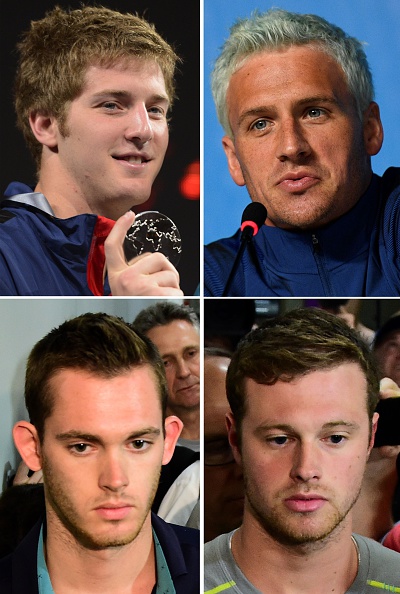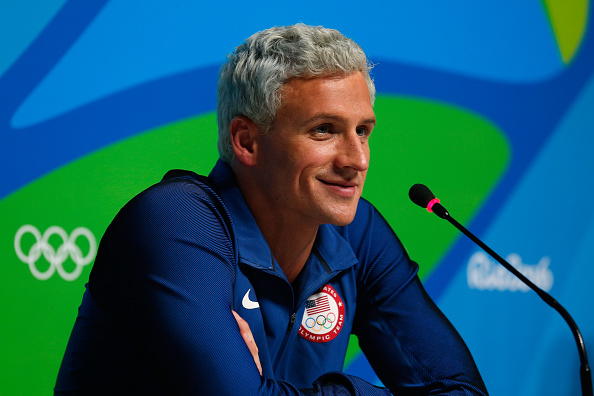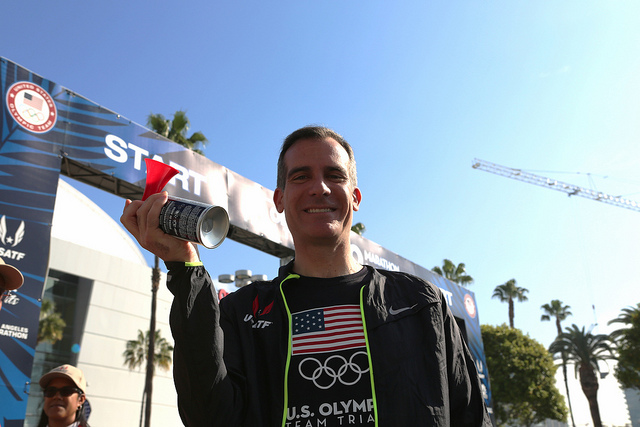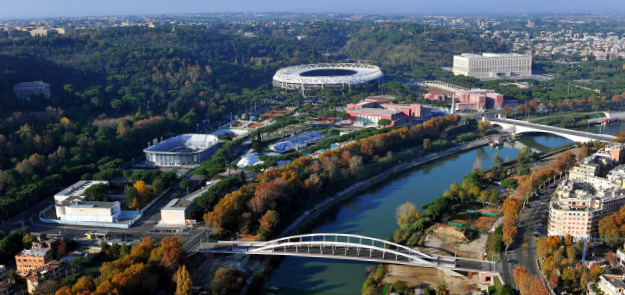Ryan Lochte gets a 10-month suspension. To share the insight offered by a teen observer: big whoop.
You know who the big winner here is? Ryan Lochte.
That conclusion is as undeniable as it is undesirable. It is also, despite the best intentions of Olympic and swim officials, the most profoundly disappointing part of this entire episode — all of it, from start to finish.
From Ryan Lochte’s perspective, it was all about Ryan Lochte on that boozy night in Rio. For the next week, it was all about Ryan Lochte instead of the scores of other athletes, American and otherwise, chasing their own Olympic dreams in Brazil.
Even since then, too. Since being back in the States from Rio, there have been only two main questions — one, how was it and, two, what about Ryan Lochte?
On Wednesday night, in the hours after TMZ broke the story of the 10-month suspension, it was still all about Lochte — instead of the athletes on U.S. Paralympic team or the Paralympic opening ceremony back in Rio.
And it was all about Lochte on Thursday, when the U.S. Olympic Committee and USA Swimming formally announced the sanction. The USA Today headline: “Lochte’s Brazil gas station pals also suspended.”
Dude seriously could not have scripted this any better in advance of being on “Dancing with the Stars.”
Think about this:
In Rio, Lochte put the USOC and USA Swimming between a rock and a hard place. Then he did the exact same thing this week — those sports officials caught between wanting to impose sanction and the deadline of wanting to make that sanction public before next Monday’s season premiere of DWTS.
For that matter, the USOC and USA Swimming were in the same sort of rock-and-hard place dilemma in making it plain Lochte and the three others — Jimmy Feigen, Gunnar Bentz and Jack Conger — had to be expecting a formal response. In embarrassing themselves, they also embarrassed the USOC and USA Swimming. So something had to be done. But what should that something be, and to what purpose?
Lochte also loses $100,000 in medal bonus money. That’s inconsequential in comparison to the four sponsors who have dropped him. But another has already said it intends to pick him up so he is clearly the farthest thing from radioactive.
The other three got four months away from the U.S. national team. Big whoop.
Bentz is back in college at Georgia. Conger is at Texas. They still can swim for their college teams.
Lochte has to do 20 hours of community service, Bentz 10 for violating the Olympic Village curfew rules for athletes under 21. As swimming’s world governing body, FINA, pointed out, the International Olympic Committee insisted on a community service element.
Bottom line:
It’s all profoundly disturbing.
Lochte is not a bad guy. Indeed, he can be a very good guy — always willing to sign autographs, especially for kids. He is personable. He can be very likable.
On the theory that everyone has to navigate his or her own path in this life, let’s be honest: there have to be moments when it can’t be easy being Ryan Lochte, with 12 Olympic medals, when Michael Phelps has 28.
Even so, there is so much that remains so troubling.
In late June, GQ magazine published a feature entitled “The De-Broing of Ryan Lochte,” in which he avowed that the 2016 version of himself that would be on display in Rio would be “more mature.”
After Rio, this from Lochte in People magazine:
“I made things up. I didn’t tell the truth. And that’s on me. I messed up and made a big mistake, and I’m sorry.”
Even if you want to believe him — and there is, again, a lot of good in Lochte — it’s wholly unclear that he gets it.
To be clear: that is not a referendum on Lochte’s intelligence. He is not dumb. Really, he is not.
“I’ve been thinking about it a lot, because I have a big heart, and I feel like [I] let down a lot of people,” he also told the magazine. “I feel bad that I have let people down.”
All good. Except for what he said next:
“It sucks that it was one of the main focuses of the Olympics. That’s what stinks. The media blew it up and talked about it. It got out of control, and this was all anyone could talk about.”
The media blew it up? Hello?
“Everyone started watching it and they didn’t watch the athletes. That’s another reason why I’m so hurt by it, because it took away from the Games.”
Ryan Lochte is hurting?
Where is the responsibility and accountability?
That whole actions-matter-more-than-words thing, you know.
The straight line from peeing on a gas station wall to lying about it to abandoning your teammates to deal for themselves with the consequences to being featured on one of America’s most popular television shows makes for a discordant message — a bad, very bad disconnect — when it comes to the values the Olympic movement, the USOC and USA Swimming purport to stand for.
Here was Lochte, in Rio, before the partying but after his last race, fifth in the 200-meter IM, off the podium:
“In life, in swimming, in sports, there are always ups and downs. It is what you do when you have those downs who make you what you are.”
Actions, words, etc.
It’s not that Lochte is going on DWTS. It’s that he’s going now — without taking a hard look at who he is and, in particular, the role alcohol plays in his decision-making.
At 32, he knows the bro thing comes with a sell-by date. But talking about it is one thing and acting like the mature role model he should be apparently another. The question he has yet to examine, and far away from the spotlight: why is he saying one thing and doing another?
For the sake of discussion, which requires in this context putting aside for a moment the peeing and the lying — it’s also a fair question to ask whether Lochte should have stuck around Rio. That is, should he have left Brazil when he did?
Should he, in essence, have kept to his regularly scheduled programming?
Or is the idea of “justice” in Brazil so fundamentally different that he did the right thing by getting out of dodge?
Here’s what Lochte should have done:
The moment Conger and Bentz were dragged off a plane, that is the instant Lochte should have called the USOC and USA Swimming and asked, what can or should I do?
Did he?
Looking at this from another angle:
Lochte didn’t hurt anyone. When Phelps was arrested for driving under the influence, it was because he was deemed a menace to the public health. So: why is Lochte getting more?
Because this is apples and oranges. Luckily, Phelps didn’t hurt anyone. And what’s at issue here is reputation and credibility — for Lochte, the USOC and USA Swimming.
In a statement sent to USA Today, Lochte’s lawyer, Jeff Ostrow, said, “We accept the decision as [we] believe it is in everyone’s best interest to move forward, adding in the next paragraph, “That said, in my oinion, while the collective sanctions appear to be harsh when considering what actually happened that day — Ryan did not commit a crime, he did not put the public safety at risk and he did not cheat in his sport — we will leave it to others to evaluate the appropriateness of the penalties.”
That sort of thing is called advocating for your client.
Back to reality: Phelps got six months. U.S. soccer goalie Hope Solo got six months, too. So six was a starting place for Lochte.
And yet — 10 months away from competition won’t achieve anything, practically speaking.
Frankly, it’s laughable.
Yes, it’s 10 months, ending in June 2017, with a plus — just the way Phelps had to stay away from the 2015 world championships in Kazan, Russia, Lochte will now be ineligible for the 2017 worlds in Budapest next July.
So what?
The 10 months is time Lochte would have taken off, anyway.
He was never going to be serious about 2017. In Rio, after that 200 IM, he said:
“It has been a long journey. I think now it is time for me to take a break, mentally and physically, to just get myself back to when I was a little kid having fun again. i can’t say this is my last time swimming. So we will see what happens.”
For two, as the Wall Street Journal reported in a story midway through the Rio Games, Phelps’ lengthy post-London break may now well serve as a template for others, especially older athletes such as Lochte, who is now 32. Why grind away for four solid years when, as Phelps proved conclusively, you can train less — push for maybe 18 months — and still win bunches of medals? For his part, Phelps turned 31 in late June.
For three, in keeping Phelps away from the 2015 Kazan worlds, USA Swimming could not have been any more clear about how it views what is purportedly the marquee event on the FINA calendar in odd-numbered years. Same for Lochte and 2017 in Budapest.
A note: Lochte will now lose out on the chance to win a fifth straight 200 IM worlds gold. Same theme: so what? He already has four, and fifth at the 2016 Olympics hardly makes him the odds-on 2017 favorite.
For four, and this is a nugget that swim geeks would understand immediately but takes just a few words of explanation for a wider audience:
Leaving U.S. college racing aside, because it is measured in yards, there are two kinds of racing at the world-class level, both in meters: long-course events, such as the Olympics or the (2017 Budapest) worlds, which take part in a 50-meter pool, and short-course, over a 25-meter set-up.
Lochte has for years been one of the few U.S. swimmers to excel at both, a mainstay of the U.S. short-course team.
Anytime Lochte wants, he can start racing short-course to get himself back up to speed. So it’s way off the mark, as some might suggest, that Lochte’s career is at a dead-end for two or maybe even three years, until the 2019 long-course worlds, now set for Gwangju, South Korea.
At the DWTS “cast reveal” party this week in New York, Lochte also told People, “I’m excited for, not only myself, but everyone else to forget about what happened and to move forward. I think that’s what the biggest thing is — what we’re gonna do is just move forward and show off my dancing skills.”
Just — so troubling. All around.










